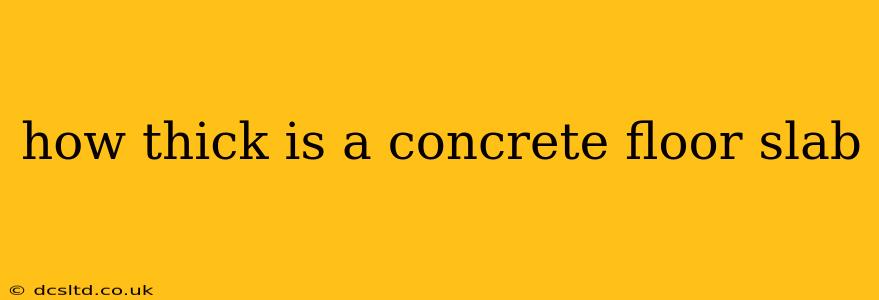Choosing the right thickness for your concrete floor slab is crucial for its structural integrity, longevity, and overall performance. A slab that's too thin can crack and fail under load, while one that's too thick is wasteful and adds unnecessary cost. This guide will explore the factors influencing slab thickness, answer common questions, and help you determine the appropriate thickness for your project.
What Factors Determine Concrete Floor Slab Thickness?
Several key factors dictate the necessary thickness of a concrete floor slab. These include:
- Intended Use: A slab supporting heavy machinery will require a much thicker pour than one for a residential garage. High-traffic areas need more substantial support.
- Soil Conditions: Unstable or expansive soils necessitate thicker slabs to prevent cracking and settling. Proper soil testing is essential before any concrete work begins.
- Span Length: The distance the slab must span between supports (e.g., beams or walls) significantly impacts the required thickness. Longer spans require thicker slabs for adequate support.
- Load Requirements: This encompasses the anticipated weight the slab will bear, including the weight of the building itself, furniture, equipment, and any potential live loads (people, vehicles).
- Climate: Freezing and thawing cycles can damage thinner slabs. In colder climates, thicker slabs with proper reinforcement are essential to prevent cracking.
- Local Building Codes: Always comply with local building codes and regulations, as they specify minimum thickness requirements for different applications.
How Thick is a Typical Concrete Floor Slab?
There isn't a single "typical" thickness. However, here's a general guideline:
- Residential Slabs (light-duty): Often range from 4 inches to 6 inches thick.
- Residential Slabs (heavy-duty): Can be 6 inches or thicker, depending on the factors mentioned above.
- Commercial Slabs: Thickness varies significantly depending on intended use and load requirements, often ranging from 6 inches to 12 inches or more.
What is the Minimum Thickness for a Concrete Floor Slab?
The minimum thickness is dictated by local building codes and the specific application. Generally, it's unsafe to go below 4 inches for residential applications, but even then, that's only appropriate for very light-duty uses. Always consult a structural engineer or your local building authority to determine the minimum permissible thickness.
How Thick Should a Concrete Slab Be for a Garage Floor?
The ideal thickness for a garage floor depends on several things: the size of the garage, the type of vehicles you'll be parking, and the presence of any heavy equipment. For standard passenger vehicles, a 4-inch slab might suffice if the soil is stable. However, for heavier vehicles, or if you plan on using the garage for workshops, a 6-inch or even thicker slab is recommended.
How Thick Should a Concrete Slab Be for a Basement Floor?
Basement floor slabs often need to withstand water pressure and potential dampness. They typically range from 4 to 6 inches thick, but adequate drainage and waterproofing are equally crucial. A thicker slab can provide added resistance to cracking due to soil pressure.
Can I Pour a Thinner Concrete Slab?
While it might seem cost-effective to pour a thinner slab, it is generally not recommended. Doing so risks structural failure, cracking, and settling. The added cost of a thicker, more robust slab is far outweighed by the potential repair costs associated with a cracked or failed thin slab.
What Happens If a Concrete Slab is Too Thin?
A concrete slab that's too thin is prone to several problems, including:
- Cracking: The slab may crack under stress from weight or movement.
- Settling: Uneven settling can occur, leading to uneven floors and potential structural damage.
- Failure: In extreme cases, a thin slab may fail completely, resulting in significant damage and repair costs.
In conclusion, determining the appropriate thickness of a concrete floor slab requires careful consideration of various factors. Consulting a structural engineer or your local building authority is always recommended to ensure the slab meets all safety and building code requirements. Investing in a properly designed and poured slab will save you money and headaches in the long run.
